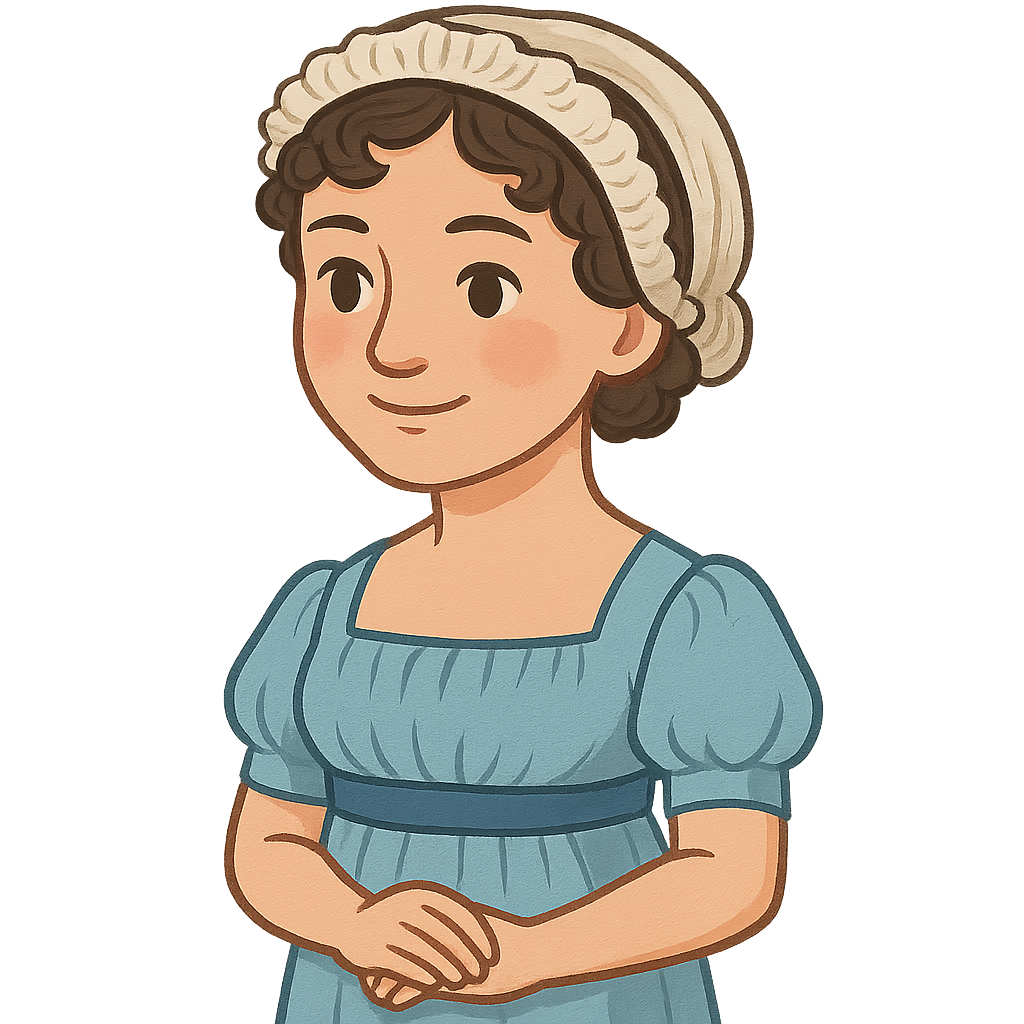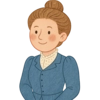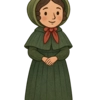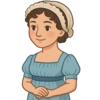Jane Austen
Hello, my name is Jane Austen, and I am a storyteller. I am known for writing novels about love, family, and the curious ways people behave, stories that have been read for more than two hundred years. But before my books found their way into the world, I was just a girl with a story in her heart, growing up in the English countryside. I was born on a cold December day in 1775, in a village called Steventon. My home was the rectory, a busy and bustling house where my father, George Austen, was the local clergyman. I was the seventh of eight children, with six brothers and one sister, Cassandra, who was my dearest friend in the entire world. Our house was always filled with noise, laughter, and activity, but my favorite place was the quietest one: my father’s library. It was a room lined from floor to ceiling with books, and I spent countless hours there, losing myself in stories of adventure, romance, and history. My father encouraged my love for reading and gave me all the paper and ink I could ever want. It wasn’t long before reading stories made me want to write my own. I didn't write serious, somber tales. Instead, I wrote funny stories and short plays that poked fun at the sentimental novels popular at the time. My family became my first and most loving audience. We would gather in the parlor in the evenings, and I would read my latest work aloud. Hearing them laugh and seeing them captivated by my words was the greatest encouragement a young writer could ask for. Cassandra, who was a wonderful artist, even drew illustrations for some of my early works. Those years in Steventon shaped me, teaching me to find the humor and drama not in grand battles or faraway lands, but in the everyday lives of the people all around me.
As I grew into a young woman, my world expanded beyond the rectory walls. The society of late 18th-century Hampshire was a whirlwind of country balls, dinner parties, and visits to neighbors. I adored dancing and would happily stay on the dance floor all night. Yet, even in the middle of a lively party, a part of me was always standing back, watching and listening. I was a quiet observer. I paid close attention to the way a lady might compliment another while secretly meaning the opposite, or how a young man would stumble over his words when talking to someone he admired. I stored these little observations away like treasures, knowing they would one day find a home in my stories. This happy and observant life, however, was turned upside down in 1801. My father announced his retirement, and we had to leave my beloved childhood home of Steventon and move to a city called Bath. I was heartbroken. The city felt noisy and confining after the freedom of the countryside. My writing seemed to dry up in that unfamiliar place. Then, a greater sadness followed when my dear father passed away in 1805. For the next four years, my mother, Cassandra, and I had no permanent home. We moved between the homes of my brothers and other relatives, living out of trunks. It was an unsettled and difficult time, and I barely wrote a single word. But even though my pen was still, my mind was not. I continued to watch, to listen, and to think about the world. Those years of uncertainty taught me a great deal about dependence, family loyalty, and the importance of having a place to call your own—lessons that would soon pour onto the page.
Everything changed for the better in the summer of 1809. My kind brother, Edward, offered my mother, Cassandra, and me a permanent home: a lovely brick cottage in the village of Chawton, not far from our old home of Steventon. Having a settled home again felt like the sun breaking through the clouds. For the first time in years, I had stability and, most importantly, a space to write. I had a small writing desk near a window, and the cottage’s creaky door always gave me a warning if a visitor was approaching, giving me just enough time to hide my manuscript pages. It was in this peaceful cottage that my career as a novelist truly began. I took out old stories I had written years before and began to revise them with a new sense of purpose. In 1811, my first novel, Sense and Sensibility, was published. It was a thrilling moment, but my name was nowhere on the book. It was simply signed, “By a Lady.” In those days, it was not considered proper for a woman of my social standing to be a professional writer. I did not mind the secrecy; it was enough to know my story was out in the world. Two years later, in 1813, Pride and Prejudice was published, a story I privately called “my own darling child.” More books followed from my little desk in Chawton. It was a wonderfully productive and happy time, filled with the quiet joy of creation and the secret excitement of knowing that people all over England were reading my words.
My time at Chawton was the most productive of my life, but sadly, it was not to last forever. In 1816, I began to grow ill with a disease that doctors at the time did not understand. By the spring of 1817, I was so weak that Cassandra took me to the nearby city of Winchester to be closer to a skilled physician. Despite her loving care, my health failed, and I passed away on July 18, 1817, at the age of forty-one. I was buried in the grand Winchester Cathedral. At the time of my death, the world at large did not know my name. But my loving brother Henry soon changed that. When two of my final novels were published after my death, he wrote a notice that finally revealed me as the author. He wanted the world to know the name of the woman behind the stories. I could never have imagined that my novels, which I wrote about the small world I knew—of families, country villages, and the complicated journey to find love and happiness—would endure for so long. I am filled with a quiet joy knowing that for over two centuries, readers have continued to find friendship, laughter, and a reflection of their own hearts within my pages. My legacy, I hope, is the simple truth that the most ordinary lives contain the most extraordinary stories.
Activities
Take a Quiz
Test what you learned with a fun quiz!
Get creative with colors!
Print a coloring book page of this topic.















